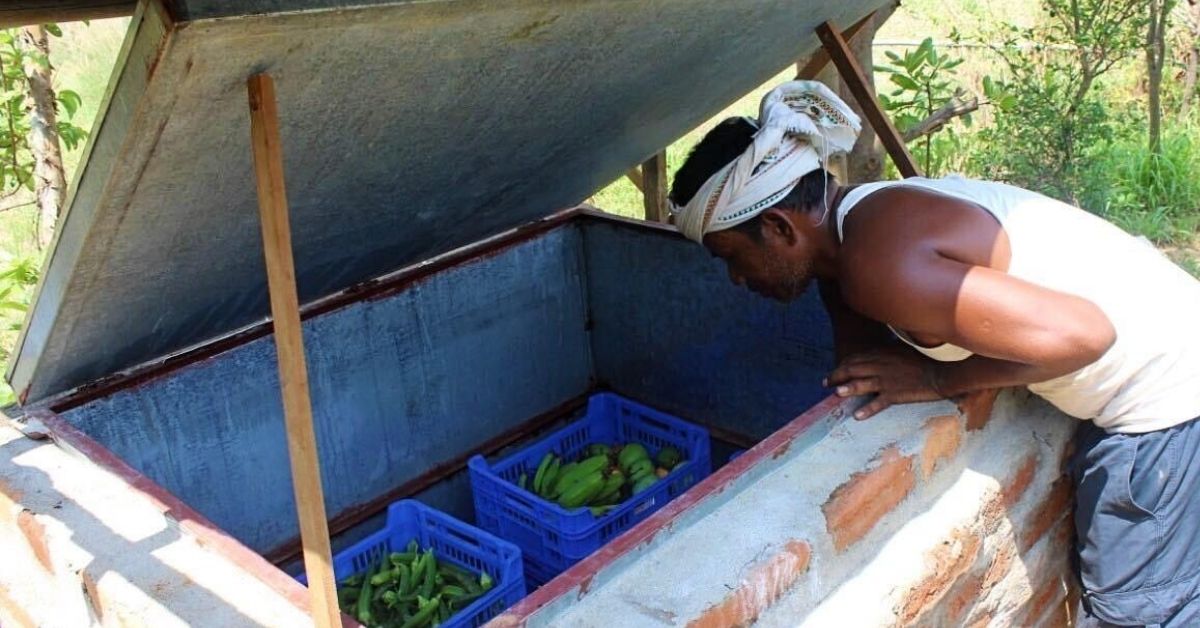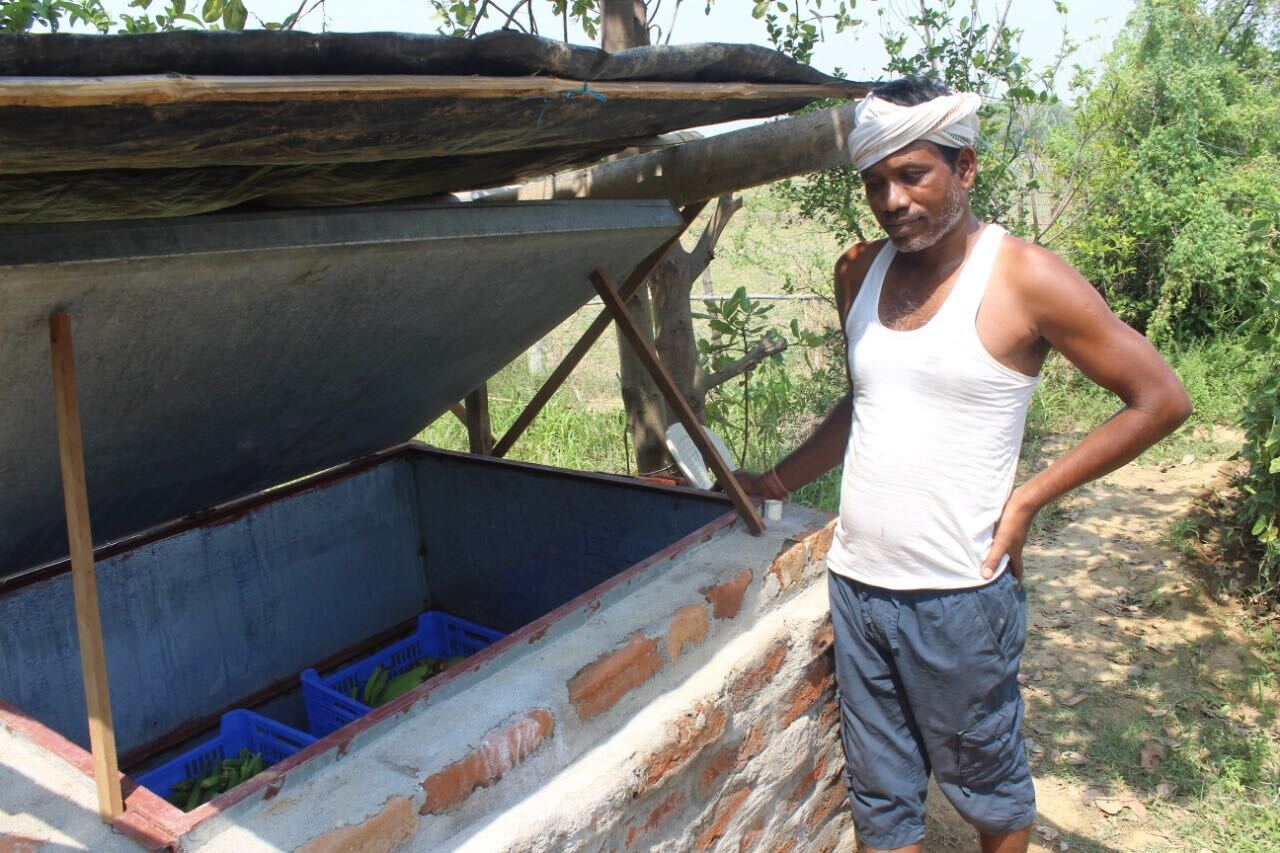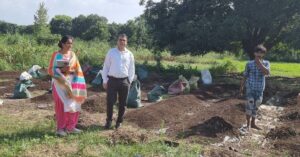IIT Grad’s Low-Cost Innovation Helps Farmers in Lockdown Earn 30% More!
This Thane-based agri-tech startup has developed a low-cost cold storage unit, which can help marginal farmers improve the quality and quantity of their produce.

Almost all agricultural products have one thing in common. They are perishable. The only way to increase the lifespan of these goods is to use cold storage solutions. But cold storage in India comes with its own set of problems — high initial investment, availability of space, interruptions in electricity supply being some of them.
This is where RuKart Technologies comes in. A Thane-based agri-tech startup, it was founded in 2019. RuKart focuses on giving farmers access to low-cost technology, which can improve the quality and quantity of their produce, thereby increasing their income.
On that note, the startup has developed a low-cost innovative machine called the Subjee Cooler to help marginalised farmers get access to cold storage facilities.

“Marginal farmers usually have landholdings of less than one hectare, and vegetable cultivation is the primary source of income for most of them. Due to its high moisture content, this commodity has a short life span and is easily perishable. While a cold storage facility can increase the shelf life of vegetables, marginalised farmers cannot afford that. With the Subjee Cooler, farmers can store their produce for up to seven days before selling them in the market, and it also helps them fetch better prices,” says Vikash Jha, the founder of RuKart Technologies.
Inspiration Behind His Startup
Vikash is a graduate of IIT-Bombay, and after graduating in 2016, he started working on a three-year-long research project, which was funded by IIT-B, and headed by the institute’s own Centre for Technology Alternatives for Rural Areas (CTARA). The focus of the study was farmers in Maharashtra and Odisha, and aimed to understand the interaction between marginalised farmers and technology.
“Initially, I had no direction. I was unaware of the problems that farmers faced. But my professor, Satish Agnihotri, helped to sensitise me towards their plight. He had been involved in a previous research project on marginal farmers, and after detailed discussions with him, I had a better understanding of the issues they faced, and decided to work on finding solutions to improve their livelihoods,” says Vikash.
The findings from his research showed that most of the agricultural-technology available in the market did not suit the needs of a marginalised farmer, nor was it affordable for them.
“In India, three out four farmers fall under the marginalised category. Meanwhile, the companies which are currently manufacturing agricultural-technologies like coolers, or planting machines, are producing them for ‘large farmers’ who have land holdings above two hectares,” says Vikash.
Another finding from his study was that there is a huge gap between professional companies that manufacture agricultural machinery, and the district administration of villages who are involved in introducing new technologies for these farmers.

“Based on the findings from this research project, I, and two of my batchmates — Sharayu Kulkarni and Gunavant Nehete started to work on ideas I had noted down, and worked towards developing affordable machinery to reduce input cost and mitigate cultivation risks for farmers. The Subjee Cooler was one of the first products that we designed, and the work was sponsored by the CTARA department,” says Vikash.
Once the design for the technology was ready, he asked another friend from his batch to design the structure. “At that time, he was living in Bidar, Karnataka, which is also a district that practises farming widely. So once he developed the prototype, it was installed at a farm in Bidar for a test run,” says Vikash.
Though he had perfected the technology, the following years were spent on modifying the design, and materials used to build it. The organisation was finally launched in September 2019.
“We spent our savings, and we also received seed funding from CTARA – IIT Bombay. Till date, we continue to receive support from professors across Computer Science and Engineering (CSE), and the Shailesh J Mehta School of Management (SJMSOM),” Vikash mentions.
Subjee Cooler, and other Solutions
The cooler is a brick-and-mortar storage facility fitted with a galvanised iron tank, with a covering on top. This simple device works on the principle of evaporative cooling — a phenomenon when water evaporates, and draws energy from its surroundings, producing a cooling effect.
Nitrogen balls in the cooling chamber ensure the temperature of the tank is lower than the ambient temperature by a margin of 5-15 degrees Celsius. It also helps to maintain the humidity 85-90 per cent higher than what is outside. The Cooler does not require any other utilities like electricity. However, it requires watering once a day.
“The cold storage units sold commercially cannot be customised for a marginal farmer’s requirement, and their capacity is more suited for farmers with larger land-holdings. Apart from that, those cold storage units require maintenance, and electricity which a marginal farmer cannot afford,” says Vikash.
Apart from this, Vikash and his team have developed two other useful products: Peek-Rakshak — a defence system to minimalism human-animal conflict, and Treadle Pump, a foot-operated water pump.
Adopting the Technology
In September 2019, RuKart approached district administrative officers in Maharashtra, and Odisha to work with them and set up these units across villages under their jurisdiction.
“Most of the units are set up in Sundargarh district of Odisha, while there are three of four in the Vardah district of Maharashtra,” says Vikash.
Bhairab Singh Patel, the District Administrative Officer of Sundargarh who was involved in the project of introducing the subjee cooler in three Odisha villages — Balisankara, Kuarmunda, and Tangarpali — says, “The farmers in these areas face a major loss in summer every year when they have to sell their produce in the local mandi. Some of them bring 100 kg of one particular vegetable and expect to finish the sale within one day. Otherwise, the produce would go to waste. With the Subjee Cooler, they can store their produce for seven days, and earn more from it.”
When the officer was approached by Vikash with the machinery, he knew immediately that it would bring a change to the life of the farmers there. Apart from that, Patel also helped RuKart Technologies identify women across those districts, who can be trained to build the equipment, deploy it, and provide help with repairing the machine.
“That same month, a women technology centre was set up in Sundargarh, and a few members from RuKart spent a few weeks identifying women across the district with the help of other self-help groups. They were given two months of training, and now these women can build technology, and repair it if necessary. Since too many elements are not involved, it is easy for them,” says Vikash.
According to Bhairab Singh Patel, the District Administrative Officer of Sundargarh, and Jayati Ekka, till date, 54 Subjee Coolers have been set up in Sundargarh, Odisha, and more than 100 farmers have benefited from it. But, the target is 100.
“Currently, a unit which can hold 1 quintal of produce is being shared by two farmers. 100 units were supposed to be installed by March or April but work had slowed due to the lockdown. We could not receive shipments of the raw materials on time. But, we are slowly getting back on track,” says Jayanti Ekka.
25-year old Sajan Kiru, a farmer in Balisankara, Odisha, has been using the Subjee Cooler since December to store the harvest from his 2.5 acre land.

“Every year, the harvest during summer months is poor. The vegetables go bad within one or two days, so we rush to sell everything. Last year, there were times when I sold a kilo of brinjal for Rs 10, and sometimes lesser. But this year, we had the Subjee Cooler, and it can hold 60 kilos of my produce. Owing to the lockdown, there was a severe disruption in the supply chain of agricultural produce. I could not take my harvest to the market because the local mandis were shut. At that time, the Cooler was very useful. I was able to store the tomatoes, brinjals, cauliflowers, and long green beans in the cooler for up to five days. In May, I was able to earn Rs 1,500 compared to last year, when I earned less than Rs 800,” he says.
Apart from that Sajan also says that the cooler encouraged him to grow more vegetables, and now it has become small for his produce. “With the Subjee Cooler, I was encouraged to grow more vegetables, and now it seems small for my use,” says Sanjan.
In the future, RuKart is working on expanding to other villages in Odisha and Maharashtra to deploy the Subjee Cooler, and their other inventions.
For price details, please write to [email protected].
Images courtesy: Vikash Jha and Jayanti Ekka
(Edited by Gayatri Mishra)
If you found our stories insightful, informative, or even just enjoyable, we invite you to consider making a voluntary payment to support the work we do at The Better India. Your contribution helps us continue producing quality content that educates, inspires, and drives positive change.
Choose one of the payment options below for your contribution-
By paying for the stories you value, you directly contribute to sustaining our efforts focused on making a difference in the world. Together, let's ensure that impactful stories continue to be told and shared, enriching lives and communities alike.
Thank you for your support. Here are some frequently asked questions you might find helpful to know why you are contributing?


This story made me
-
97
-
121
-
89
-
167














